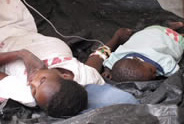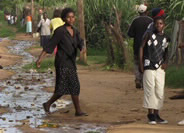
As the midnight countdown ended, cheers rang out and the crowd hugged and kissed friends and strangers in the small jazz club bar in downtown Harare.
2008 was an especially grim year in Zimbabwe -- and prospects for the coming year seem little better. The fact that Zimbabweans were celebrating the new year at all might seem surprising. But many people, or at least those with some money living in the cities, were in the mood to party, if only for a night and to forget their worries.
Zimbabwe is gripped by economic collapse. Hyperinflation, the worst in the world, has seen prices skyrocketing, making it hard for many to access food and fuel. Last month, the country's central bank introduced a ten billion Zimbabwean dollar banknote, but its actual worth, about $10 US dollars on the black market, is rapidly decreasing day by day. Most shops now only accept foreign currency, not Zimbabwean notes.
On top of the economic meltdown -- which has seen doctors, teachers, and most government staff staying away from work because their pay in local Zimbabwean dollars won't even cover their crippling transport costs -- is a serious and worsening humanitarian crisis.
A cholera outbreak in August has now affected more than 30,000 people, and claimed the lives of more than 1,600 people, with cases now being reported across every province in the country.
Cholera is an easily preventable and treatable water-borne disease. But its spread in Zimbabwe is being fuelled by the collapse of health, sanitation and water services. There are limited medical supplies and many don't have access to clean drinking water or proper sanitation. The onset of heavy rains this month is worsening an already alarming situation.
A second humanitarian crisis, still under-reported, is worsening malnutrition and food shortages. There have been several years of failed harvests; a serious shortage of seeds and fertilisers; and driving hunger is forcing many to eat seeds instead of planting them for next year's crops.
The UN has warned that around five million people, more than half of the population, will soon rely on food aid.
The country is also facing political deadlock. Efforts to form a power-sharing government between the ZANU-PF party of President Robert Mugabe, who has been in power since 1980, and the opposition Movement for Democratic Change, has stalled.
I got a somber insight into many of the problems the country was facing as I visited Kadoma city in central Zimbabwe, about 180 kilometres west of the capital, Harare.
Oxfam has been working in the area, drilling boreholes so that communities can access safe drinking water; distributing hygiene kits and undertaking health promotion work.
The health authorities have reported nearly a thousand cholera cases since mid November, with 29 deaths. Unofficial statistics put the figure even higher.

The cholera treatment centre - mainly consisting of makeshift canvas tents -- was packed with 120 patients. And staff were working flat-out.
Two people had died that day; and I was shown a tent containing the wrapped corpses of seven bodies, several of which had lain there for several days and were swelling. Fuel shortages and rocketing prices meant that there were no vehicles available to take the bodies to the local cemetery.
"Things aren't stabilising," said one nurse, "they're getting worse. We're seeing more patients every day."
With early access to treatment -- intravenous fluids and oral rehydration -- patients can recover quickly and be discharged within days.
But a visit to a nearby housing estate -- described as a cholera 'timebomb' by a senior health official -- made clear why the epidemic is sweeping across the country.
The sewage system had broken down; and residents were disposing human and other waste in the narrow lanes around their homes.

Children played alongside open sewers. There was no running water and the community of around 1200 depended on water from a borehole Oxfam had provided.
Those images haunted me as I sat in the jazz bar that night. Zimbabweans might have little to celebrate, other than surviving another difficult year; but they are still pinning their hopes that the coming year might bring some change for the better.
